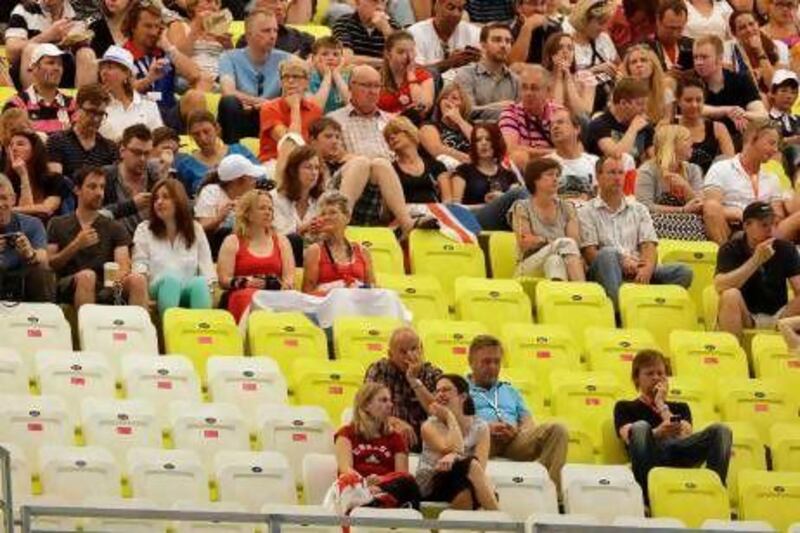The London Games chairman, Sebastian Coe, has promised that students, teachers and troops will be given tickets to fill empty seats at the events.
Lord Coe, who heads the London Organising Committee for the Olympic Games (LOCOG), spoke out yesterday as anger grew about the number of vacant spectator places clearly visible in coverage of the first two days' events.
He said it "should be kept in perspective", but admitted that "I don't want to see swathes of seats empty and will make sure we can do everything we can to fill them".
"For example, we looked at gymnastics today and could see empty seats in the accredited area, so were able to move some troops so they were sitting there this morning enjoying the gymnastics."
Many of the empty seats in venues across the capital were in lower-tier VIP areas and Lord Coe promised to "name and shame" sponsors who were not using their tickets.
During morning swimming heats at the Aquatics Centre, there were an estimated 500 empty seats in one block alone, while there were thought to be more than 1000 seats vacant at the gymnastics, despite would-be buyers being told sessions were sold out.
Gaps in seating were also visible at handball, volleyball, badminton and basketball.
The spokeswoman for the opposition Labour party on the Oympics, Tessa Jowell, said it was vital that everybody holding a ticket was aware of "the responsibility and the obligation to use it".
The IOC president, Jacques Rogge, met officials from LOCOG yesterday morning to discuss the issue.
His spokesman, Mark Adams, said: "There are always going to be teething problems. No one wants to see empty seats but we are working closely with our colleagues at the local level to deal with it."
LOCOG blamed the empty seating on the fact that sections were reserved for "sponsors, media, international federation and even the support staff for those competing".
Olympic sponsors Coca-Cola and Visa hit back, stating that they gave away most of their seating quotas to the public in promotional offers.
Coca-Cola said its competitions allowed prize winners to "choose the event they really wanted to attend".
"We have also invited some long-standing partners, employees, and customers to attend the games," a spokesperson said. "We believe that usage levels of our tickets have been extremely high so far."
Visa said that "the great majority," of its seats were being used by "ordinary cardholders who have won them through competitions or promotions".
This is cold comfort to the thousands who applied for tickets only to be disappointed entirely or to find themselves with a fraction of their order. Many took to Twitter and social network sites to voice their frustration and call for the problem to be resolved.
In the run-up to the Games, concern had been voiced over the number of tickets given to corporate sponsors, Olympic officials and VIP guests.
There were also fears that transportation delays may have meant that many ticket holders simply failed to arrive on time.
Britain's culture secretary, Jeremy Hunt, described the scenes of empty seats as "very disappointing".
Originally, about 6.6 million of the 8.8 million tickets were made available to members of the public. However, many of those who applied failed to get tickets for any events at all, while others were only successful with a fraction of their total orders.
The balloting system ended with some of the most expensive tickets still available and about 500,000 football tickets removed from sale.
Officials have discussed operating a "recycling" scheme, similar to a policy used at Wimbledon for the tennis championships, that would see unused tickets resold at a much cheaper price to spectators who were already at the Olympic Park.
They have also said they would make it very clear to sponsors that they must only take tickets they are certain would be used.
A spokesperson for the organisers insisted: "The public areas were all packed and rocking."






